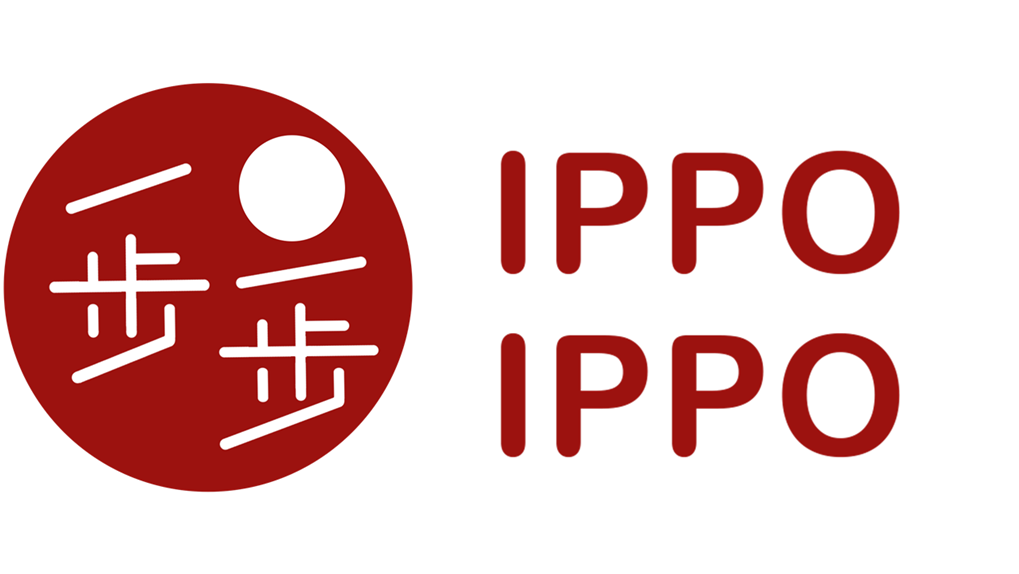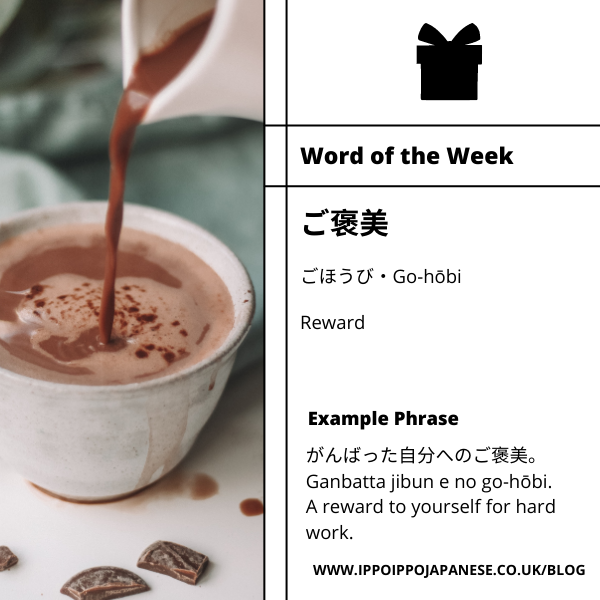Photo credit: Maddi Bazzocco
Posted: 23rd Aug 2023
Hello and welcome to the Ippo Ippo Japanese Word of the Week!
This Week's Word Is...
ご褒美
- In hiragana: ごほうび
- In rōmaji: go-hōbi
Before We Begin
None of the links in this post are affiliated, which means I don't make money via companies like Amazon when you click on them. If you'd like to support the blog with a donation (however small!), you can do so via Ko-fi.
What Does ご褒美 (go-hōbi) Mean?
ご褒美 (go-hōbi) means "reward" or "prize". In my experience, it is most often used when talking about a reward for hard work - especially one rewarded to oneself! In this sense, it could also be described as a "treat".
How is it Written?
ご褒美 (go-hōbi) is contains two kanji: 褒 and 美。
褒 means to "praise" or "extol", and is also used in the word 褒める (homeru - to praise or compliment).
美 means "beauty" and is used in words such as 美しい (utsukushii - beautiful), 美術 (bijutsu - art) and 美人 (bijin - beautiful woman).
What Are Some Popular ご褒美 (go-hōbi)?
Before we dive into how to use the word ご褒美 (go-hōbi) in a sentence, let's take a look at a 2022 survey of 500 people that asked two interesting questions.
① 自分へご褒美をあげようと思う、またあげたタイミングは?
(Jibun e go-hōbi wo ageyō to omou, mata ageta taimingu wa? - At what kind of times do you think of giving yourself go-hōbi/have you given yourself go-hōbi?)
The top five responses to this question were:
- ストレスがたまったとき (Sutoresu ga tamatta toki - When I feel stressed)
- 疲れていると感じたとき (Tsukareteiru to kanjita toki - When I feel tired)
- リフレッシュしたいとき (Rifuresshu shitai toki - When I want to feel refreshed)
- ボーナスがでたとき (Bōnasu ga deta toki - When I've received a [work] bonus)
- 仕事で良い結果が出たとき (Shigoto de yoi kekka ga deta toki - When I produce good results at work)
② どのようなご褒美をあげましたか?
(Dono yōna go-hōbi wo agemashita ka? - What kind of go-hōbi have you given yourself?)
The top 10 responses to the this question were:
- お菓子・デザート (O-kashi/dezaato - sweets/dessert)
- 外食 (Gaishoku - Eating out)
- 食品 (Shokuhin - Food products)
- 旅行 (Ryokō - Travel)
- 化粧品 (Keshōhin - Cosmetics)
- アクセサリー (Akusesarii - [An] accessory)
- 飲料 (Inryō - [A] drink)
- エステ・マッサージ・サロン
- ゲーム (Geemu - [A] game)
- バッグ (Baggu - [A] bag)
Spotting a theme at all? I know that food and drink are both things I like to treat myself to! (Did you spot the hot chocolate in this post's top image?)
For those who are curious, the above survey features responses from 28% men and 72% women, with 65% of respondents aged between 20 and 40 years old. Click here for full info.
How to Use ご褒美 (go-hōbi) in a Sentence
Alright! Now we have an idea of the culture behind ご褒美 (go-hōbi), let's talk about how the word is used.
Example Sentences
- 私は頑張っている自分にご褒美をあげたい。(Watashi wa ganbatteiru jibun ni go-hōbi wo agetai - I want to give a go-hōbi to myself for working hard)
- テストに受かったご褒美に、グッチのバッグを買ってもらった。(Tesuto ni ukatta go-hōbi ni, gucchi no baggu wo katte moratta - I got [someone] to buy me a Gucci bag as a reward for passing my test)
- 今日頑張った自分へのご褒美に、焼肉を食べよう。(Kyō ganbatta jibun e no go-hōbi ni, yakiniku wo tabeyō - I'm going to eat yakiniku as a reward to myself today)
- ご褒美がないと頑張ることができない。(Go-hōbi ga nai to ganbaru koto ga dekinai - I can't work hard/give my all without a reward)
- よくがんばったね。ご褒美にお菓子をあげるね。(Yoku ganbatta ne. Go-hōbi ni o-kashi wo ageru ne. - You worked hard. I'll give you [a] sweet as a reward.)
Sources:
ご褒美 (go-hōbi) and あげる (ageru - to give)
If you've been paying attention, you may have noticed that go-hōbi often pops up with the verb あげる (ageru), meaning "to give". For those who've had the pleasure of encountering the two Japanese "give" verbs あげる (ageru) and くれる (kureru) before, you may be wondering why you would say あげる (ageru) for something that you give to yourself.
The reason for this is that if you were to say くれる (kureru), it would imply that someone else is giving the reward to you. As such, we default to あげる (ageru) as the default word for "give".
If you've not come across these words and concepts before - or if you just want a bit of revision - check out this great video by KANJI - Link:
ご褒美 (go-hōbi) Stories
If you have a moment, check out these two short stories (in web comic form) featuring ご褒美 (go-hōbi):
- An untitled story featuring プリン (purin - Japanese pudding). Originally posted by @mochimochi__i on Twitter, 22nd Nov 2019, with the text 月に2回くらいやるメンタルケアです (Tsuki ni ni kai kurai yaru mentaru kea desu - Self care I practise around twice a month).
- 1000円ごほうび始めました (Sen en go-hōbi hajimemashita - I started a ¥1,000 go-hōbi) - part one in a series all about the author giving themself a regular go-hōbi worth ¥1,000.
ご褒美 (go-hōbi) Products
Finally, you may also be interested to see some products that feature the word ご褒美 (go-hōbi):
- ポチ袋:pochi-bukuro - a decorative paper envelope used for congratulatory gifts featuring the phrase がんばったごほうび (a go-hōbi for your hard work)
- ご褒美チョコ:go-hōbi choko - go-hōbi chocolate
- ご褒美ヨーグルト:go-hōbi yōguruto - go-hōbi yoghurt
You've reached the end of this post! I hope you enjoyed it.
For updates on posts like this sent straight to your inbox, sign up to my newsletter (sent no more than once a month):

Support Me on Ko-fi
If you've enjoyed this post and would like to see more like it in future, please consider sending a donation - however small! - via Ko-fi. I don't include any affiliated links or ads on my blog, so every little helps!
Please donate via the portal below or by going directly to the Ippo Ippo Japanese Ko-fi page.







